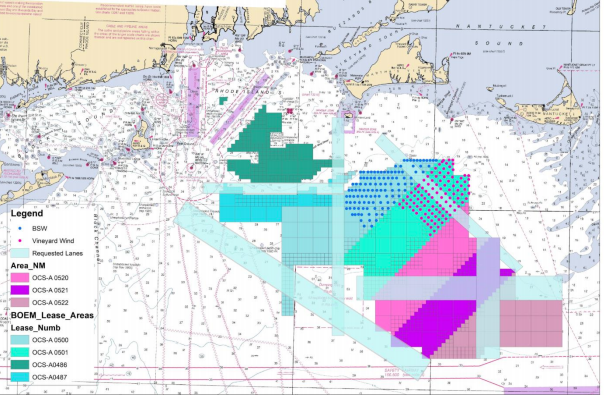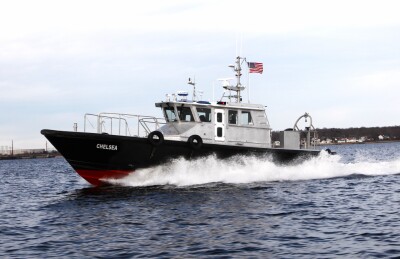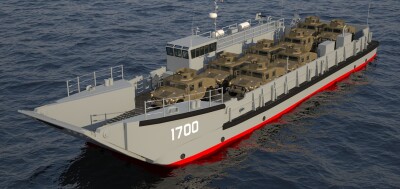The former Coast Guard waterways management chief for New England has joined offshore wind energy company Ørsted, as the emerging U.S. industry comes to grips with pushback from commercial fishermen and other interests.
Ed LeBlanc, a former Coast Guard officer and most recently chief of the Waterways Management Division for Coast Guard Sector Southeastern New England, will be manager of marine affairs for Ørsted U.S. Offshore Wind, the Denmark-based energy company’s American division.
In his last position of 16 years with the Coast Guard First District, LeBlanc was in the forefront of planning to how the newly arriving offshore wind industry could coexist with commercial fishing and maritime transportation traffic in the Northeast. An element of that will be safe vessel transit lanes through planned wind turbine arrays off Martha’s Vineyard, Mass.

Ed LeBlanc, the former chief of waterways management at the Coast Guard Southeast New England sector, is Ørsted's new manager of marine affairs. LinkedIn photo.
One conceptual layout proposed in late 2018 by the Responsible Offshore Development Alliance, a coalition of fishing groups, would set aside lanes with setbacks so fishing vessels can safely transit between ports like New Bedford, Mass., to Georges Bank and other fishing grounds.
The spacing and orientation of the turbine arrays is under intense debate, with commercial fishing groups in New England and New York warning the designs could make mobile gear fishing impossible. The National Oceanic and Atmospheric Administration has refused to sign off on a draft environmental impact statement for the Vineyard Wind project, an impasse that triggered a decision by Secretary of the Interior David Bernhardt to extend the review of the 800-megawatt project, and look further to potential cumulative environmental impacts of a dozen other large wind projects planned off the U.S. East Coast.
The decision appears to be a sudden slowdown in what has been strong federal support for developing offshore wind. Democratic and Republican lawmakers from Massachusetts and Louisiana – both states that stand to gain jobs from building and operating the new offshore industry – wrote to Bernhardt and Secretary of Commerce Wilbur Ross Aug. 16 urging “your departments to work together to find a solution that will address concerns raised by stakeholders, protect the environment, and allow the Vineyard Wind project to remain viable.”
Signed by Sens. Ed Markey and Elizabeth Warren of Massachusetts and Bill Cassidy and John Kennedy of Louisiana, the letter makes the case that offshore wind power will benefit Massachusetts residents with reliable energy – and Gulf of Mexico states, where the prospect of building turbine foundations and offshore wind service vessels is a bright hope for the maritime industry. Reps. Joseph Kennedy III, Richard Neal, and William Keating of Massachusetts and Steve Scalise of Louisiana also signed on to the message.
The members of Congress wrote that “Louisiana and Gulf Coast companies that have decades of experience working in the Gulf of Mexico are eager to make needed investments to support this project and future offshore wind energy projects.”
For Ørsted, adding LeBlanc, with his 40 years' experience with the Coast Guard, to its team is part of a push to build relationships with the larger maritime community.
“We are thrilled to add such an accomplished veteran of the USCG to our team. Ed’s breadth of experience will be a significant addition to the Marine Affairs department,” said John O’Keeffe, head of marine affairs U.S. for Ørsted, in announcing LeBlanc’s move.
LeBlanc has "invaluable institutional knowledge of how the offshore wind industry interacts with the marine community,” according to the Ørsted statement. “His experience working with industry since its nascency in the U.S. mirrors Ørsted’s own experience with the industry’s beginnings in Europe.”
The company says it “will bolster its marine community outreach efforts as its projects move closer to the construction phase. Ørsted’s commitment to working with the marine community, including the fishing industry, demonstrates how it has successfully built offshore wind farms across Europe to deliver clean energy and economic development to local communities.”
Ørsted is holding three of those community outreach sessions in New Jersey next week to talk about its proposed Ocean Wind project off Atlantic City. The first will be held Aug. 26 at 6 p.m. in the Stockton University Atlantic City Academic Center, located at 3711 Atlantic Avenue, Atlantic City.
In addition to the company’s outreach campaign, LeBlanc will help coordinate the company’s safety operations with the Coast Guard, and aim to establish industry-wide standards. That is a critical area for the service’s vessel and aviation operators, who must train to safely transit and conduct search and rescue operations amid turbine arrays.
The Coast Guard recently conducted its first-ever such exercise working with Ørsted and General Electric at the Block Island Wind Farm off Rhode Island.
That five-turbine, 30 MW array is the first U.S. commercial offshore wind pilot project – and a fraction of the size proposed for energy developments on offshore federal leases.





